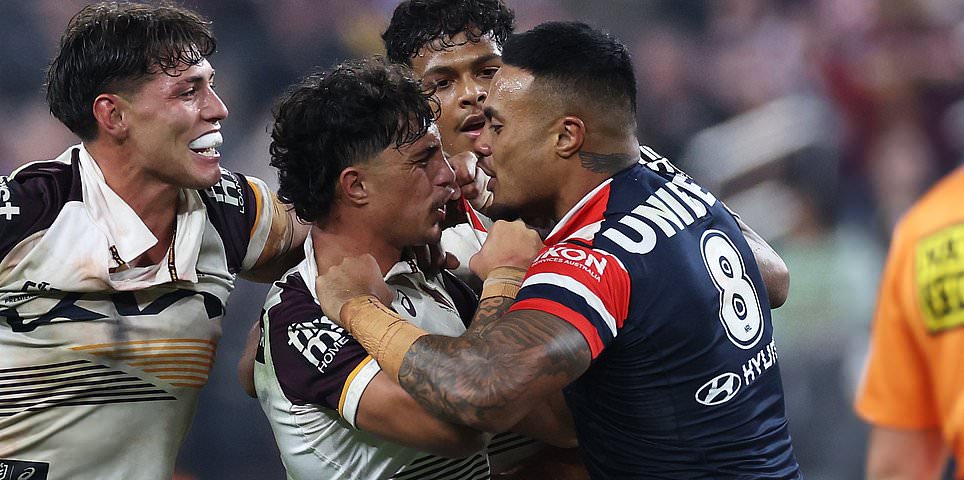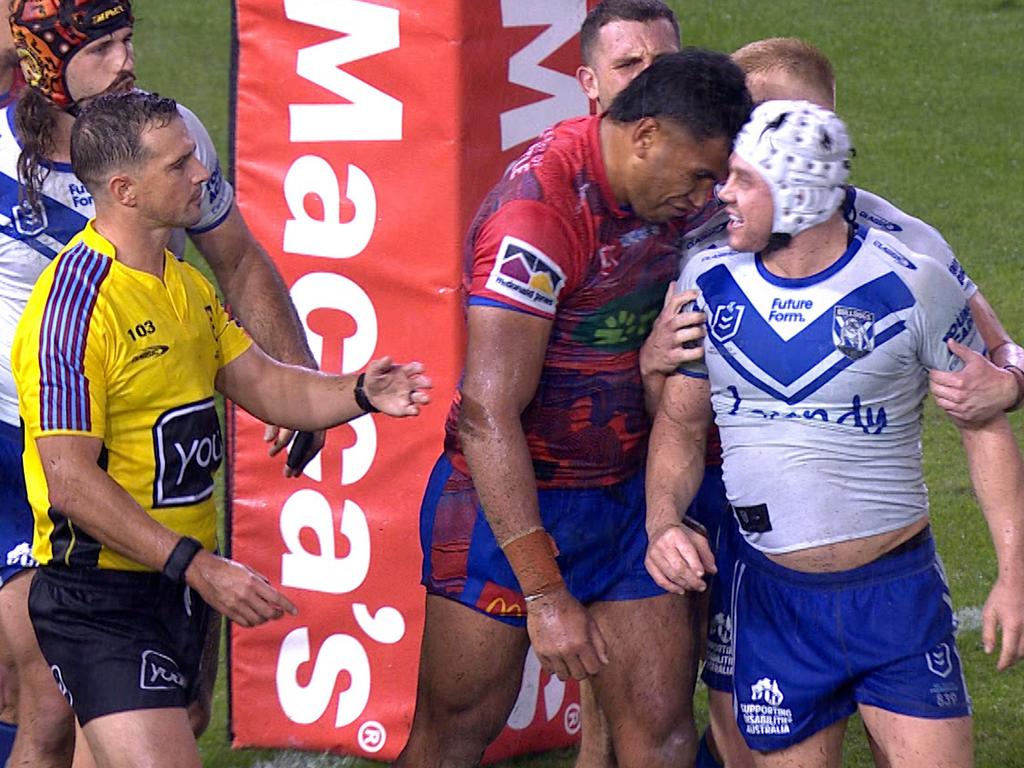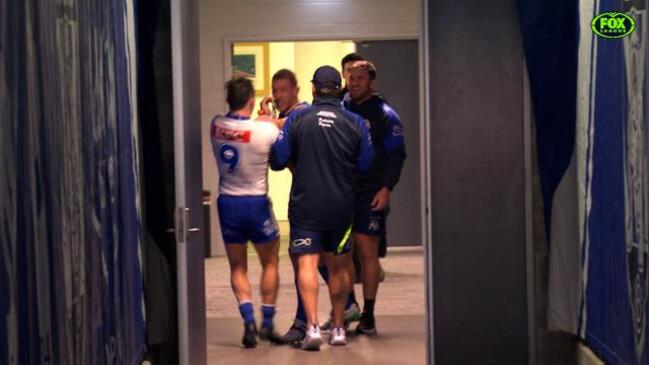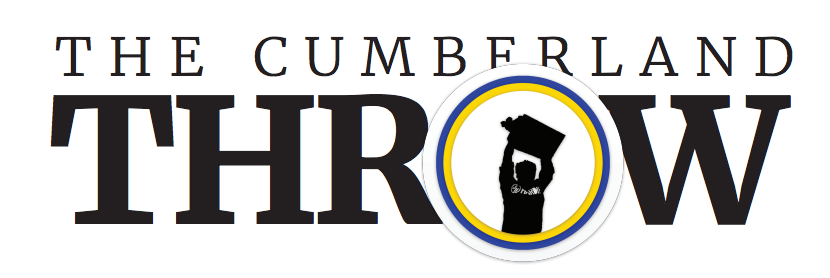Consistency.
It’s something we all crave in the NRL. Consistency in the performance of our teams, consistency in the rules and their application by referees, consistency in judiciary decisions – we live in hope and it’s the hope that kills us.
The reality is that we probably have unrealistic expectations or demands, because we are dealing with humans and humans make errors. Lots of them.
But there is an aspect of the game where, if the NRL don’t act on their own contradictory application of the rules, the code could be under threat of a future generation of players focussed on getting over the top of opponents via sledging, taunting and total disrespect.
This may seem like the least of concerns to many supporters, but sometimes the most unwanted aspects of human behaviour infiltrate via a slow creep, where it’s barely noticed.
I believe that poor player conduct, particularly sledging and taunting, has gone through that point and has reached a level where it threatens to become influential in the outcome of games, as well as the behaviour in the stands and on social media and most concerning, on children playing the game.
Just this weekend, there was an incident involving the alleged abuse of Junior Paulo and Dylan Brown from a spectator in the stands at Newcastle. Football involves emotional connections, but there is a line and it’s being crossed on the field and off.
This season, the NRL has addressed issues of dissent towards match officials, with Graham Annesley discussing the problem in his Monday media briefing, and now the NSWRL has established a statewide judiciary to handle occurrences of this nature.

Sledging crossed the line in Vegas
The NRL has also been prepared to come down hard on any conduct involving racism, and rightly so. The game can do without such taunting or slurs, and the lengthy suspension of Spencer Leniu for his slur against Ezra Mam was an appropriate punishment and message to send to players.
But just as troubling, but not actually addressed, are incidents of sledging or gamesmanship that might not be racial but are still personal. Ones that have reached the point where targeted players have physically lashed out in response to the verbal attacks aimed at them. And of course, in those incidents the targeted players are the ones to suffer the major consequence.
That physical reaction is probably a reasonable barometer of what has been said. In fact, eliciting a loss of self control and putting an opponent off their game is the aim of the trash talking, but is it a matter of anything goes to achieve that end?
Furthermore, should the capacity to elicit such reactions be admired or even rewarded in the NRL?
Rewarding unsportsmanlike behaviour, sledging or taunting actually threatens to undermine the integrity of the game.
This current troubling trend is reminiscent of the issues plaguing the National Basketball League (NBL), where similar behaviour has been allowed to proliferate unchecked. The parallels between these leagues highlight a broader cultural shift that threatens to erode the values traditionally upheld in Australian sports.
This decline in sportsmanship is not just a series of isolated incidents but indicative of a systemic issue within the league. The lack of stringent repercussions for such actions has emboldened players to push the boundaries further, knowing that the potential rewards are high and the negative consequences are often minimal.

The head butting incident against Mahoney
A notable example in 2024 has been the sledging from Reed Mahoney. Prior to this season, Reed had never been renowned for such conduct, yet this year he’s been involved in ugly incidents that have resulted in the suspension of opposition players.
He’s not been the first and won’t be the last to engage in such behaviour, and the problem is that the consequences actually reward and encourage him, and others, to continue to push the boundaries.
More troubling, the media attention that it garners would be influencing junior players to replicate what the professionals like Reed are doing. After all, getting penalties or having players sent to the bin is advantageous to the team, isn’t it?
Therein lies the mixed messages from the NRL.
Whilst “verballing” an opponent and getting them to lose control is rewarded in professional football, the NRL’s own Code of Conduct instructs junior players that it’s completely unacceptable.
Consider the following extract from that very code:
Always respect the Referee’s decision.
Never become involved in acts of foul play.
Honour both the spirit and letter of the competition rules and live up to the highest ideals of ethics and sportsmanship; avoid gamesmanship, and respect the traditions of the game.
Never engage in disrespectful conduct of any sort including profanity, sledging, obscene gestures, offensive remarks, trash-talking, taunting or other actions that are demeaning to other players, officials or supporters.
It’s clear that the NRL’s own guidelines specify that players should not engage in disrespectful conduct, and yet the players at the highest level are actually able to gain an advantage by doing exactly that.
This is no minor contradiction.
When teaching children to play, we teach them the best parts of games. We show them the game as it should be played. We teach them how to play the game in its most pure sense.
We want them to fall in love with it.
We don’t teach them to sledge, because we don’t want them to learn how to insult, intimidate, offend or humiliate others. Nor do we want them to be on the receiving end of it. It’s a life lesson and it is a clear mission statement at all junior clubs to assist young people in becoming good community members.
Those junior rugby league clubs, via their wonderful volunteers, do a fine job at that.
I’m not naive enough to suggest that profanities or sledging won’t occur on the footy field. The language on a footy field is not like a normal workplace, so let’s make a clear acknowledgement of that. However, when the trash talk crosses the line to the point where it draws an uncontrolled reaction from players who have grown up in the language of the game, and the only serious consequence is faced by the target of that sledging, something is badly messed up.

Jack Hetherington was handed a suspension for this incident. Reed Mahoney was fined
As stated, at the very least there are conflicting messages sent by the game, and it’s left to parents and junior coaches to explain to their kids how they are expected to follow a code of conduct that doesn’t apply to their heroes. That winning doesn’t mean disrespecting or humiliating opponents, despite evidence to the contrary.
Thankfully, there are still examples of players having genuine concern for the welfare of their opponents, especially when injuries occur.
Recently, fans witnessed Joe Ofahengaue providing immediate assistance to a player who was rendered unconscious. Joe’s respect for the well-being of others, one that transcends team rivalries, is the perfect example of an NRL role model.
Australia should never covet a degradation of fair go values. We don’t want a disrespecting of opponents in the battle, it’s an ugly culture that we can do without.
As a reminder, look how the sledging between the Australian and Indian cricket teams reached boiling point, bubbled over into the stands, and became a focal point of media coverage. The celebrated “clever sledges” in cricket such as “you just dropped the World Cup” crept over time into personal insults.
It’s far better to celebrate or acknowledge some of the acts of sportsmanship that have gone hand in hand with legendary moments in Australian sport.
Let’s never forget John Landy stopping to help his greatest rival Ron Clarke to his feet after he fell during the 1956 Australian Mile Championships. And Landy went on to win that race.
And more should be made of Paralympian Kurt Fearnley and the Australian officials declining a re-race of the 800m final at the 2008 Paralympics after finishing second to the UK’s David Weir. They requested that the winner retain the race despite the IPC finding a lane violation.
All of this doesn’t mean diminishing the entertainment value that we see in footy or in any sport when individuals or teams celebrate their successes. Case in point, the Dolphins Hamiso Tabuai-Fidow.
The Hammer is one of the most popular players in the NRL. Fans love his try celebrations, but those moments never come at the expense of his opposition. It’s a joyous honouring of his heritage via the shark totem, and everyone embraces it, especially the kids.
Far better that the next generation look for a way of honouring others as they enjoy their sport rather than finding ways to disrespect them.
Addressing this issue requires a clear stance from the NRL.
The game relies on the star players promoting the code and the values it purports to represent. Visits to schools, junior clubs and community groups form a significant part of their strategy.
Rugby league cannot afford any hypocrisy from their role models talking about values to live by that they themselves fail to represent in their own workplace – the football field.
Without question the game must continue to punish those who lose control on the field, those that lash out in acts of violence, but they must also hold to account those whose unsportsmanlike conduct elicit such responses.
Should they find associated audio and video footage of the type of sledging and taunting that the NRL clearly dictates as breaching the code of conduct, they must suspend the offender. Make it significant too.
If we have a game where consistent, defined, significant punishment, rather than reward, is the consequence for such conduct, then the governing body will finally be drawing a line in the sand.
And the future of the game and Australian sport in general, will be better for it.
Robbo


Good post – agreed. It’s all talk and cheap – let’s be honest here Reed has obviously had Ennis in his ear at C’bury. What goes around will come around. It’s also a small man’s syndrome
He was never like that at Parra Milo, not that I can remember.
He was proabbly coached differently and dare i say it his ego was not as big back then….it is definitely something he has been encouraged to do hence the incidents and results from this. He needs one good smack to the chops..
One of, if not the best article read on this site . Period.
Robbo will be happy to read that.
A blight on the game. Also the rushing in, grabbing an opponent by the jersey and snarling into his fsce. The greats never eent on with this stuff. Arthur Beetson was famous for making an ironic funny remark but never sledged perdonally. It was said you’d know if you really upset Arthur; you’d wake up in hospital.
Very good Noel
Well said. Intentionally hiding behind the rules to run off at the mouth is a bad practice and a bad look. Stamp it out.
Absolutely. When you read the code of conduct, to reward sledges is incredible hypocrisy
A gread read thank you
Brilliant. Absolutely brilliant.